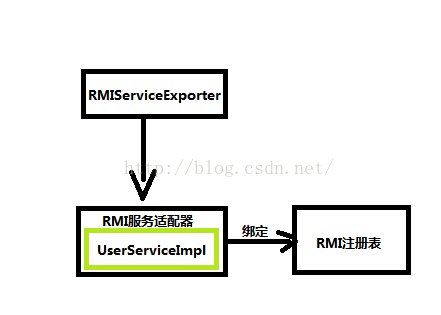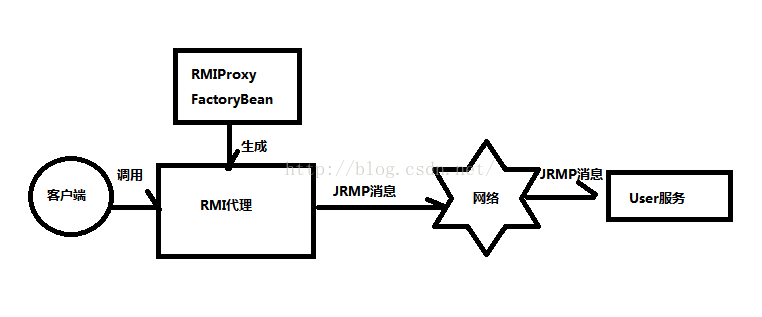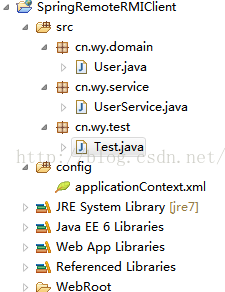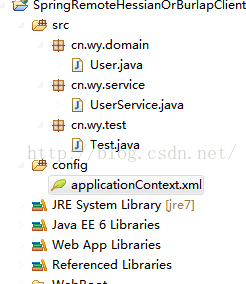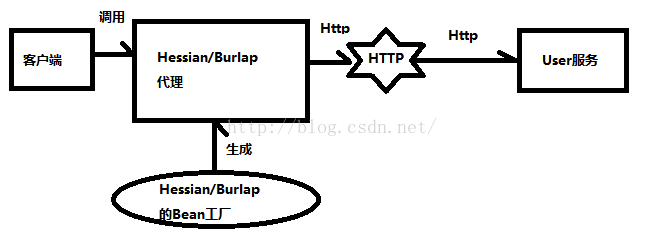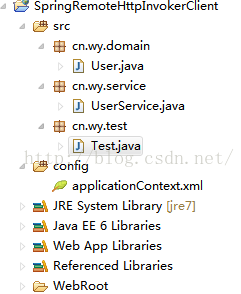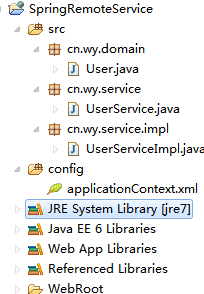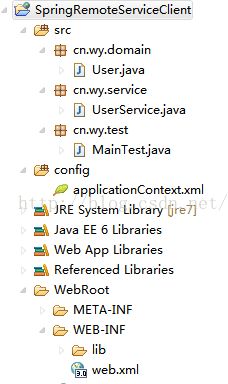Spring与远程调用RMI、Hessian、Burlap、HttpInvoker、Jax-WS
RMI
RMI(即Remote Method Invoke 远程方法调用)。在Java中,只要一个类extends了java.rmi.Remote接口,即可成为存在于服务器端的远程对象,供客户端访问并提供一定的服务。JavaDoc描述:Remote 接口用于标识其方法可以从非本地虚拟机上调用的接口。任何远程对象都必须直接或间接实现此接口。只有在“远程接口”(扩展java.rmi.Remote 的接口)中指定的这些方法才可远程使用。
它将调用的方法绑定到服务端的定义好的接口上,对于防火墙的穿透力明显不够的。
RMIServiceExporter将POJO包装到服务适配器中,并将服务适配器绑定到RMI注册表中,从而将POJO转换为RMI服务。
示例:
服务端
public class UserDaoImpl implements UserDao {
public static List<User> userList = new ArrayList<User>();
// 构造一部分数据,在实际的项目中数据是从数据库中获取的
static{
for (long i = 0; i < 10; i++) {
User user = new User(i, "wy" + i);
userList.add(user);
}
}
@Override
public List<User> selectUsersList() {
return userList;
}
}
public class User implements Serializable {
private static final long serialVersionUID = 1L;
private Long userId;
private String userName;
public User() {
super();
}
public User(Long userId, String userName) {
super();
this.userId = userId;
this.userName = userName;
}
public Long getUserId() {
return userId;
}
public void setUserId(Long userId) {
this.userId = userId;
}
public String getUserName() {
return userName;
}
public void setUserName(String userName) {
this.userName = userName;
}
}
public class UserServiceImpl implements UserService {
@Resource
private UserDao userDao;
@Override
public List<User> getUserList() {
List<User> userList = userDao.selectUsersList();
return userList;
}
}
服务端Test,运行Test将POJO绑定到定义的端口上去。
public class Test {
public static void main(String[] args) {
ApplicationContext context = new ClassPathXmlApplicationContext("classpath:applicationContext.xml");
}
}
ApplicationContext.xml
<beans xmlns="http://www.springframework.org/schema/beans" xmlns:xsi="http://www.w3.org/2001/XMLSchema-instance" xmlns:mvc="http://www.springframework.org/schema/mvc" xmlns:context="http://www.springframework.org/schema/context" xmlns:aop="http://www.springframework.org/schema/aop" xmlns:tx="http://www.springframework.org/schema/tx" xsi:schemaLocation="http://www.springframework.org/schema/beans http://www.springframework.org/schema/beans/spring-beans-3.2.xsd http://www.springframework.org/schema/mvc http://www.springframework.org/schema/mvc/spring-mvc-3.2.xsd http://www.springframework.org/schema/context http://www.springframework.org/schema/context/spring-context-3.2.xsd http://www.springframework.org/schema/aop http://www.springframework.org/schema/aop/spring-aop-3.2.xsd http://www.springframework.org/schema/tx http://www.springframework.org/schema/tx/spring-tx-3.2.xsd "> <bean id = "userDao" class = "cn.wy.dao.impl.UserDaoImpl"/> <bean id = "userService" class = "cn.wy.service.impl.UserServiceImpl"></bean> <bean class = "org.springframework.remoting.rmi.RmiServiceExporter"> <property name="service" ref="userService"></property> <property name="serviceName" value = "userServiceRemote"></property> <property name="serviceInterface" value="cn.wy.service.UserService"></property> <property name="registryPort" value="1992"></property> </bean> <context:annotation-config></context:annotation-config> </beans>
项目结构
接口调用客户端
RMIProxyFactoryBean生成代理对象,该对象代表客户端来负责与远程的RMI服务进行通信,客户端通过服务的接口与代理进行交互,如同远程服务就是一个本地的POJO.
ApplicationContext.xml
<beans xmlns="http://www.springframework.org/schema/beans" xmlns:xsi="http://www.w3.org/2001/XMLSchema-instance" xmlns:mvc="http://www.springframework.org/schema/mvc" xmlns:context="http://www.springframework.org/schema/context" xmlns:tx="http://www.springframework.org/schema/tx" xsi:schemaLocation="http://www.springframework.org/schema/beans http://www.springframework.org/schema/beans/spring-beans-3.2.xsd http://www.springframework.org/schema/mvc http://www.springframework.org/schema/mvc/spring-mvc-3.2.xsd http://www.springframework.org/schema/context http://www.springframework.org/schema/context/spring-context-3.2.xsd http://www.springframework.org/schema/tx http://www.springframework.org/schema/tx/spring-tx-3.2.xsd "> <!-- <bean id = "userService" class="cn.wy.service.impl.UserServiceImpl"></bean> --> <bean name = "userServiceRemote" class = "org.springframework.remoting.rmi.RmiProxyFactoryBean"> <property name="serviceUrl" value = "rmi://127.0.0.1:1992/userServiceRemote"></property> <property name="serviceInterface" value = "cn.wy.service.UserService"></property> </bean> <context:annotation-config></context:annotation-config> </beans>测试类
public class Test {
public static void main(String[] args) {
ApplicationContext context = new ClassPathXmlApplicationContext("classpath:applicationContext.xml");
UserService userService = (UserService) context.getBean("userServiceRemote");
List<User> userList = userService.getUserList();
for (User user : userList) {
System.out.println(user);
}
}
}
项目结构
其中user和UserService与服务端的一致
源代码
远程调用源代码
Hessian
Hessian是一个轻量级的remoting onhttp工具,使用简单的方法提供了RMI的功能。 相比WebService,Hessian更简单、快捷。采用的是二进制RPC协议,因为采用的是二进制协议,所以它很适合于发送二进制数据。具有较好的穿墙能力。
服务端
User(set、get方法已经省去,这部分的类和RMI中基本上一致)
public class User implements Serializable {
private static final long serialVersionUID = 1L;
private Long userId;
private String userName;
}
public class UserDaoImpl implements UserDao {
public static List<User> userList = new ArrayList<User>();
// 构造一部分数据,在实际的项目中数据是从数据库中获取的
static{
for (long i = 0; i < 10; i++) {
User user = new User(i, "wy" + i);
userList.add(user);
}
}
@Override
public List<User> selectUsersList() {
return userList;
}
}
UserServiceImpl
public class UserServiceImpl implements UserService {
@Resource
private UserDao userDao;
@Override
public List<User> getUserList() {
List<User> userList = userDao.selectUsersList();
return userList;
}
}
ApplicationContext.xml
<beans xmlns="http://www.springframework.org/schema/beans" xmlns:xsi="http://www.w3.org/2001/XMLSchema-instance" xmlns:mvc="http://www.springframework.org/schema/mvc" xmlns:context="http://www.springframework.org/schema/context" xmlns:aop="http://www.springframework.org/schema/aop" xmlns:tx="http://www.springframework.org/schema/tx" xsi:schemaLocation="http://www.springframework.org/schema/beans http://www.springframework.org/schema/beans/spring-beans-3.2.xsd http://www.springframework.org/schema/mvc http://www.springframework.org/schema/mvc/spring-mvc-3.2.xsd http://www.springframework.org/schema/context http://www.springframework.org/schema/context/spring-context-3.2.xsd http://www.springframework.org/schema/aop http://www.springframework.org/schema/aop/spring-aop-3.2.xsd http://www.springframework.org/schema/tx http://www.springframework.org/schema/tx/spring-tx-3.2.xsd "> <bean id = "userDao" class = "cn.wy.dao.impl.UserDaoImpl"/> <bean id = "userService" class = "cn.wy.service.impl.UserServiceImpl"></bean> <bean id = "hessianUserService" class = "org.springframework.remoting.caucho.HessianServiceExporter"> <property name="service" ref="userService"></property> <property name="serviceInterface" value="cn.wy.service.UserService"></property> </bean> <bean id="urlMapping" class = "org.springframework.web.servlet.handler.SimpleUrlHandlerMapping"> <property name="mappings"> <value> /userService.service=hessianUserService </value> </property> </bean> <context:annotation-config></context:annotation-config> </beans>
Web.xml
<?xml version="1.0" encoding="UTF-8"?>
<web-app xmlns:xsi="http://www.w3.org/2001/XMLSchema-instance" xmlns="http://java.sun.com/xml/ns/javaee" xmlns:web="http://java.sun.com/xml/ns/javaee/web-app_2_5.xsd" xsi:schemaLocation="http://java.sun.com/xml/ns/javaee http://java.sun.com/xml/ns/javaee/web-app_3_0.xsd" version="3.0">
<display-name></display-name>
<welcome-file-list>
<welcome-file>index.jsp</welcome-file>
</welcome-file-list>
<servlet>
<servlet-name>userService</servlet-name>
<servlet-class>org.springframework.web.servlet.DispatcherServlet</servlet-class>
<init-param>
<param-name>contextConfigLocation</param-name>
<param-value>classpath:applicationContext.xml</param-value>
</init-param>
</servlet>
<servlet-mapping>
<servlet-name>userService</servlet-name>
<url-pattern>*.service</url-pattern>
</servlet-mapping>
</web-app>
项目结构
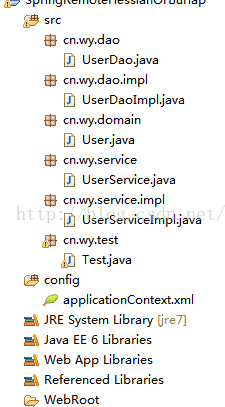
调用端
ApplicationContext.xml
<beans xmlns="http://www.springframework.org/schema/beans" xmlns:xsi="http://www.w3.org/2001/XMLSchema-instance" xmlns:mvc="http://www.springframework.org/schema/mvc" xmlns:context="http://www.springframework.org/schema/context" xmlns:tx="http://www.springframework.org/schema/tx" xsi:schemaLocation="http://www.springframework.org/schema/beans http://www.springframework.org/schema/beans/spring-beans-3.2.xsd http://www.springframework.org/schema/mvc http://www.springframework.org/schema/mvc/spring-mvc-3.2.xsd http://www.springframework.org/schema/context http://www.springframework.org/schema/context/spring-context-3.2.xsd http://www.springframework.org/schema/tx http://www.springframework.org/schema/tx/spring-tx-3.2.xsd "> <!-- <bean id = "userService" class="cn.wy.service.impl.UserServiceImpl"></bean> --> <bean name = "userServiceRemote" class = "org.springframework.remoting.caucho.HessianProxyFactoryBean"> <!-- 链接根据项目的名称以及自己定义的服务名称进行设置 --> <property name="serviceUrl" value = "http://127.0.0.1:8080/SpringRemote/userService.service"></property> <property name="serviceInterface" value = "cn.wy.service.UserService"></property> </bean> <context:annotation-config></context:annotation-config> </beans>
测试类
public class Test {
public static void main(String[] args) {
ApplicationContext context = new ClassPathXmlApplicationContext("classpath:applicationContext.xml");
System.out.println("====HessianTest->====");
UserService userService = (UserService) context.getBean("userServiceRemote");
List<User> userList = userService.getUserList();
for (User user : userList) {
System.out.println(user);
}
}
}
项目结构
源代码
远程调用源代码
Burlap
Burlap是一种基于XML远程调用技术,但与其他基于XML的远程技术(例如SOAP或者XML-RPC)不同,Burlap的消息结构尽可能的简单,不需要额外的外部定义语言(例如WSDL或IDL)。
服务端
User(set、get方法已经省去,这部分的类和RMI中基本上一致)
public class User implements Serializable {
private static final long serialVersionUID = 1L;
private Long userId;
private String userName;
}UserServiceImpl
public class UserDaoImpl implements UserDao {
public static List<User> userList = new ArrayList<User>();
// 构造一部分数据,在实际的项目中数据是从数据库中获取的
static{
for (long i = 0; i < 10; i++) {
User user = new User(i, "wy" + i);
userList.add(user);
}
}
@Override
public List<User> selectUsersList() {
return userList;
}
}
测试类
public class Test {
public static void main(String[] args) {
ApplicationContext context = new ClassPathXmlApplicationContext("classpath:applicationContext.xml");
}
}
ApplicationContext.xml
<beans xmlns="http://www.springframework.org/schema/beans" xmlns:xsi="http://www.w3.org/2001/XMLSchema-instance" xmlns:mvc="http://www.springframework.org/schema/mvc" xmlns:context="http://www.springframework.org/schema/context" xmlns:aop="http://www.springframework.org/schema/aop" xmlns:tx="http://www.springframework.org/schema/tx" xsi:schemaLocation="http://www.springframework.org/schema/beans http://www.springframework.org/schema/beans/spring-beans-3.2.xsd http://www.springframework.org/schema/mvc http://www.springframework.org/schema/mvc/spring-mvc-3.2.xsd http://www.springframework.org/schema/context http://www.springframework.org/schema/context/spring-context-3.2.xsd http://www.springframework.org/schema/aop http://www.springframework.org/schema/aop/spring-aop-3.2.xsd http://www.springframework.org/schema/tx http://www.springframework.org/schema/tx/spring-tx-3.2.xsd "> <bean id = "userDao" class = "cn.wy.dao.impl.UserDaoImpl"/> <bean id = "userService" class = "cn.wy.service.impl.UserServiceImpl"></bean> <bean id="urlMapping" class = "org.springframework.web.servlet.handler.SimpleUrlHandlerMapping"> <property name="mappings"> <value> /userServiceBurlap.service=burlapUserService </value> </property> </bean> <bean id = "burlapUserService" class = "org.springframework.remoting.caucho.BurlapServiceExporter"> <property name="service" ref="userService"></property> <property name="serviceInterface" value="cn.wy.service.UserService"></property> </bean> <context:annotation-config></context:annotation-config> </beans>
Web.xml
<?xml version="1.0" encoding="UTF-8"?>
<web-app xmlns:xsi="http://www.w3.org/2001/XMLSchema-instance" xmlns="http://java.sun.com/xml/ns/javaee" xmlns:web="http://java.sun.com/xml/ns/javaee/web-app_2_5.xsd" xsi:schemaLocation="http://java.sun.com/xml/ns/javaee http://java.sun.com/xml/ns/javaee/web-app_3_0.xsd" version="3.0">
<display-name></display-name>
<welcome-file-list>
<welcome-file>index.jsp</welcome-file>
</welcome-file-list>
<servlet>
<servlet-name>userService</servlet-name>
<servlet-class>org.springframework.web.servlet.DispatcherServlet</servlet-class>
<init-param>
<param-name>contextConfigLocation</param-name>
<param-value>classpath:applicationContext.xml</param-value>
</init-param>
</servlet>
<servlet-mapping>
<servlet-name>userService</servlet-name>
<url-pattern>*.service</url-pattern>
</servlet-mapping>
</web-app>
项目结构
客户端
ApplicationContext.xml
<beans xmlns="http://www.springframework.org/schema/beans" xmlns:xsi="http://www.w3.org/2001/XMLSchema-instance" xmlns:mvc="http://www.springframework.org/schema/mvc" xmlns:context="http://www.springframework.org/schema/context" xmlns:tx="http://www.springframework.org/schema/tx" xsi:schemaLocation="http://www.springframework.org/schema/beans http://www.springframework.org/schema/beans/spring-beans-3.2.xsd http://www.springframework.org/schema/mvc http://www.springframework.org/schema/mvc/spring-mvc-3.2.xsd http://www.springframework.org/schema/context http://www.springframework.org/schema/context/spring-context-3.2.xsd http://www.springframework.org/schema/tx http://www.springframework.org/schema/tx/spring-tx-3.2.xsd "> <!-- <bean id = "userService" class="cn.wy.service.impl.UserServiceImpl"></bean> --> <bean name = "userServiceBurlap" class = "org.springframework.remoting.caucho.BurlapProxyFactoryBean"> <property name="serviceUrl" value = "http://127.0.0.1:8080/SpringRemote/userServiceBurlap.service"></property> <property name="serviceInterface" value = "cn.wy.service.UserService"></property> </bean> <context:annotation-config></context:annotation-config> </beans>测试类
public class Test {
public static void main(String[] args) {
ApplicationContext context = new ClassPathXmlApplicationContext("classpath:applicationContext.xml");
System.out.println("====BurlapTest->====");
userService = (UserService) context.getBean("userServiceBurlap");
userList = userService.getUserList();
for (User user : userList) {
System.out.println(user);
}
}
}
项目结构
Hessian与Burlap
HessianProxyFactoryBean 和BurlapProxyFactoryBean生成代理对象负责通过HTTP与远程对象通信。其中Hessian为二进制、而Burlap为xml文件形式。
源代码
远程调用源代码
HttpInvoker
Spring HTTP invoker 是 spring 框架中的一个远程调用模型,执行基于 HTTP 的远程调用(意味着可以通过防火墙),并使用 java 的序列化机制在网络间传递对象。客户端可以很轻松的像调用本地对象一样调用远程服务器上的对象,这有点类似于 webservice ,但又不同于 webservice ,区别如下:
| webservice |
HTTP invoker |
| 跨平台,跨语言 |
只支持 java 语言 |
| 支持 SOAP ,提供 wsdl |
不支持 |
| 结构庞大,依赖特定的 webservice 实现,如 xfire等 |
结构简单,只依赖于 spring 框架本身 |
示例:
服务端
User:
public class User implements Serializable {
private static final long serialVersionUID = 1L;
private Long userId;
private String userName;
}UserDaoImpl
public class UserDaoImpl implements UserDao {
public static List<User> userList = new ArrayList<User>();
// 构造一部分数据,在实际的项目中数据是从数据库中获取的
static{
for (long i = 0; i < 10; i++) {
User user = new User(i, "wy" + i);
userList.add(user);
}
}
@Override
public List<User> selectUsersList() {
return userList;
}
}
UserServiceImpl
public class UserServiceImpl implements UserService {
@Resource
private UserDao userDao;
@Override
public List<User> getUserList() {
List<User> userList = userDao.selectUsersList();
return userList;
}
}
ApplicationContext.xml
<beans xmlns="http://www.springframework.org/schema/beans" xmlns:xsi="http://www.w3.org/2001/XMLSchema-instance" xmlns:mvc="http://www.springframework.org/schema/mvc" xmlns:context="http://www.springframework.org/schema/context" xmlns:aop="http://www.springframework.org/schema/aop" xmlns:tx="http://www.springframework.org/schema/tx" xsi:schemaLocation="http://www.springframework.org/schema/beans http://www.springframework.org/schema/beans/spring-beans-3.2.xsd http://www.springframework.org/schema/mvc http://www.springframework.org/schema/mvc/spring-mvc-3.2.xsd http://www.springframework.org/schema/context http://www.springframework.org/schema/context/spring-context-3.2.xsd http://www.springframework.org/schema/aop http://www.springframework.org/schema/aop/spring-aop-3.2.xsd http://www.springframework.org/schema/tx http://www.springframework.org/schema/tx/spring-tx-3.2.xsd "> <bean id = "userDao" class = "cn.wy.dao.impl.UserDaoImpl"/> <bean id = "userService" class = "cn.wy.service.impl.UserServiceImpl"></bean> <bean id = "httpInvokerService" class = "org.springframework.remoting.httpinvoker.HttpInvokerServiceExporter"> <property name="service" ref="userService"></property> <property name="serviceInterface" value="cn.wy.service.UserService"></property> </bean> <bean id = "urlMapping" class = "org.springframework.web.servlet.handler.SimpleUrlHandlerMapping"> <property name="mappings"> <value> /userService.service=httpInvokerService </value> </property> </bean> <context:annotation-config></context:annotation-config> </beans>
Web.xml
<?xml version="1.0" encoding="UTF-8"?>
<web-app xmlns:xsi="http://www.w3.org/2001/XMLSchema-instance" xmlns="http://java.sun.com/xml/ns/javaee" xmlns:web="http://java.sun.com/xml/ns/javaee/web-app_2_5.xsd" xsi:schemaLocation="http://java.sun.com/xml/ns/javaee http://java.sun.com/xml/ns/javaee/web-app_3_0.xsd" version="3.0">
<display-name></display-name>
<welcome-file-list>
<welcome-file>index.jsp</welcome-file>
</welcome-file-list>
<servlet>
<servlet-name>userService</servlet-name>
<servlet-class>org.springframework.web.servlet.DispatcherServlet</servlet-class>
<init-param>
<param-name>contextConfigLocation</param-name>
<param-value>classpath:applicationContext.xml</param-value>
</init-param>
</servlet>
<servlet-mapping>
<servlet-name>userService</servlet-name>
<url-pattern>*.service</url-pattern>
</servlet-mapping>
</web-app>
项目结构
客户端
ApplicationContext.xml
<beans xmlns="http://www.springframework.org/schema/beans" xmlns:xsi="http://www.w3.org/2001/XMLSchema-instance" xmlns:mvc="http://www.springframework.org/schema/mvc" xmlns:context="http://www.springframework.org/schema/context" xmlns:tx="http://www.springframework.org/schema/tx" xsi:schemaLocation="http://www.springframework.org/schema/beans http://www.springframework.org/schema/beans/spring-beans-3.2.xsd http://www.springframework.org/schema/mvc http://www.springframework.org/schema/mvc/spring-mvc-3.2.xsd http://www.springframework.org/schema/context http://www.springframework.org/schema/context/spring-context-3.2.xsd http://www.springframework.org/schema/tx http://www.springframework.org/schema/tx/spring-tx-3.2.xsd "> <!-- <bean id = "userService" class="cn.wy.service.impl.UserServiceImpl"></bean> --> <bean name = "userServiceRemote" class = "org.springframework.remoting.httpinvoker.HttpInvokerProxyFactoryBean"> <property name="serviceUrl" value = "http://127.0.0.1:8080/SpringRemote/userService.service"></property> <property name="serviceInterface" value = "cn.wy.service.UserService"></property> </bean> <context:annotation-config></context:annotation-config> </beans>
Test测试类
public class Test {
public static void main(String[] args) {
ApplicationContext context = new ClassPathXmlApplicationContext("classpath:applicationContext.xml");
UserService userService = (UserService) context.getBean("userServiceRemote");
List<User> userList = userService.getUserList();
for (User user : userList) {
System.out.println(user);
}
}
}
项目结构
源代码
远程调用源代码
Jax-WS
JAX-WS规范是一组XML web services的JAVA API,JAX-WS允许开发者可以选择RPC-oriented或者message-oriented 来实现自己的web services。
示例:
服务端
User
public class User {
private Long userId;
private String userName;
private String sex;
}UserService
@WebService
@SOAPBinding(style = Style.RPC)
public interface UserService {
public User getUserByName(@WebParam(name ="name")String name);
public void setUser(User user);
}
UserServiceImpl
@WebService
@SOAPBinding(style = Style.RPC)
public class UserServiceImpl implements UserService {
@Override
public User getUserByName(@WebParam(name = "name")String name) {
User user = new User();
user.setUserId(System.currentTimeMillis());
user.setSex("M");
user.setUserName(name);
return user;
}
@Override
public void setUser(User user) {
System.out.println("############Server setUser###########");
System.out.println("setUser:" + user);
}
}
ApplicationContext.xml
<?xml version="1.0" encoding="UTF-8"?> <beans xmlns="http://www.springframework.org/schema/beans" xmlns:context="http://www.springframework.org/schema/context" xmlns:jaxws="http://cxf.apache.org/jaxws" xmlns:xsi="http://www.w3.org/2001/XMLSchema-instance" xsi:schemaLocation="http://www.springframework.org/schema/beans http://www.springframework.org/schema/beans/spring-beans-3.1.xsd http://www.springframework.org/schema/context http://www.springframework.org/schema/context/spring-context-3.1.xsd http://cxf.apache.org/jaxws http://cxf.apache.org/schemas/jaxws.xsd"> <import resource="classpath*:META-INF/cxf/cxf.xml"/> <import resource="classpath*:META-INF/cxf/cxf-extension-soap.xml"/> <import resource="classpath*:META-INF/cxf/cxf-servlet.xml"/> <bean id="userServiceBean" class="cn.wy.service.impl.UserServiceImpl"/> <bean id="outLoggingInterceptor" class="org.apache.cxf.interceptor.LoggingOutInterceptor"/> <!-- 注意下面的address,这里的address的名称就是访问的WebService的name --> <jaxws:server id="userService" serviceClass="cn.wy.service.UserService" address="/Users"> <jaxws:serviceBean> <!-- 要暴露的 bean 的引用 --> <ref bean="userServiceBean"/> </jaxws:serviceBean> <jaxws:outInterceptors> <ref bean="outLoggingInterceptor"/> </jaxws:outInterceptors> </jaxws:server> <jaxws:client id="userWsClient" serviceClass="cn.wy.service.UserService" address="http://localhost:8080/SpringRemoteService/Users"/> </beans>
Web.xml
<?xml version="1.0" encoding="UTF-8"?>
<web-app version="3.0"
xmlns="http://java.sun.com/xml/ns/javaee"
xmlns:xsi="http://www.w3.org/2001/XMLSchema-instance"
xsi:schemaLocation="http://java.sun.com/xml/ns/javaee
http://java.sun.com/xml/ns/javaee/web-app_3_0.xsd">
<display-name></display-name>
<welcome-file-list>
<welcome-file>index.jsp</welcome-file>
</welcome-file-list>
<!-- 加载Spring容器配置 -->
<listener>
<listener-class>org.springframework.web.context.ContextLoaderListener</listener-class>
</listener><!-- 设置Spring容器加载配置文件路径 -->
<context-param>
<param-name>contextConfigLocation</param-name>
<param-value>classpath*:applicationContext.xml</param-value>
</context-param>
<listener>
<listener-class>org.springframework.web.util.IntrospectorCleanupListener</listener-class>
</listener>
<servlet>
<servlet-name>CXFService</servlet-name>
<servlet-class>org.apache.cxf.transport.servlet.CXFServlet</servlet-class>
</servlet>
<servlet-mapping>
<servlet-name>CXFService</servlet-name>
<url-pattern>/*</url-pattern>
</servlet-mapping>
</web-app>
客户端
项目结构
User
public class User {
private Long userId;
private String userName;
private String sex;
}
UserService
@WebService
@SOAPBinding(style = Style.RPC)
public interface UserService {
public User getUserByName(@WebParam(name ="name")String name);
public void setUser(User user);
}
测试类
public class MainTest {
public static void main(String[] args) {
ApplicationContext ctx = new ClassPathXmlApplicationContext(
"applicationContext.xml");
UserService service = ctx.getBean("userWsClient", UserService.class);
System.out.println(">>>>>>><<<<<<<<<<");
User user = service.getUserByName("wy");
System.out.println(user);
user.setSex("test");
service.setUser(user);
System.out.println("========================="+user.getUserName());
}
}ApplicationContext.xml
<?xml version="1.0" encoding="UTF-8"?> <beans xmlns="http://www.springframework.org/schema/beans" xmlns:context="http://www.springframework.org/schema/context" xmlns:jaxws="http://cxf.apache.org/jaxws" xmlns:xsi="http://www.w3.org/2001/XMLSchema-instance" xsi:schemaLocation="http://www.springframework.org/schema/beans http://www.springframework.org/schema/beans/spring-beans-3.1.xsd http://www.springframework.org/schema/context http://www.springframework.org/schema/context/spring-context-3.1.xsd http://cxf.apache.org/jaxws http://cxf.apache.org/schemas/jaxws.xsd"> <import resource="classpath*:META-INF/cxf/cxf.xml"/> <import resource="classpath*:META-INF/cxf/cxf-extension-soap.xml"/> <import resource="classpath*:META-INF/cxf/cxf-servlet.xml"/> <jaxws:client id="userWsClient" serviceClass="cn.wy.service.UserService" address="http://localhost:8080/SpringRemoteService/Users"/> </beans>
注意:上面的ApplicationContext.xml中Meta-INF/cxf/*.xml这几个xml文件,我这里没有添加,程序是可以正常运行的。
源代码
远程调用源代码
